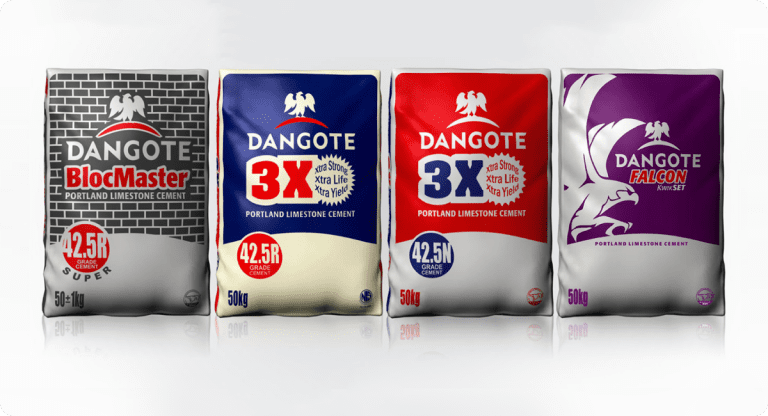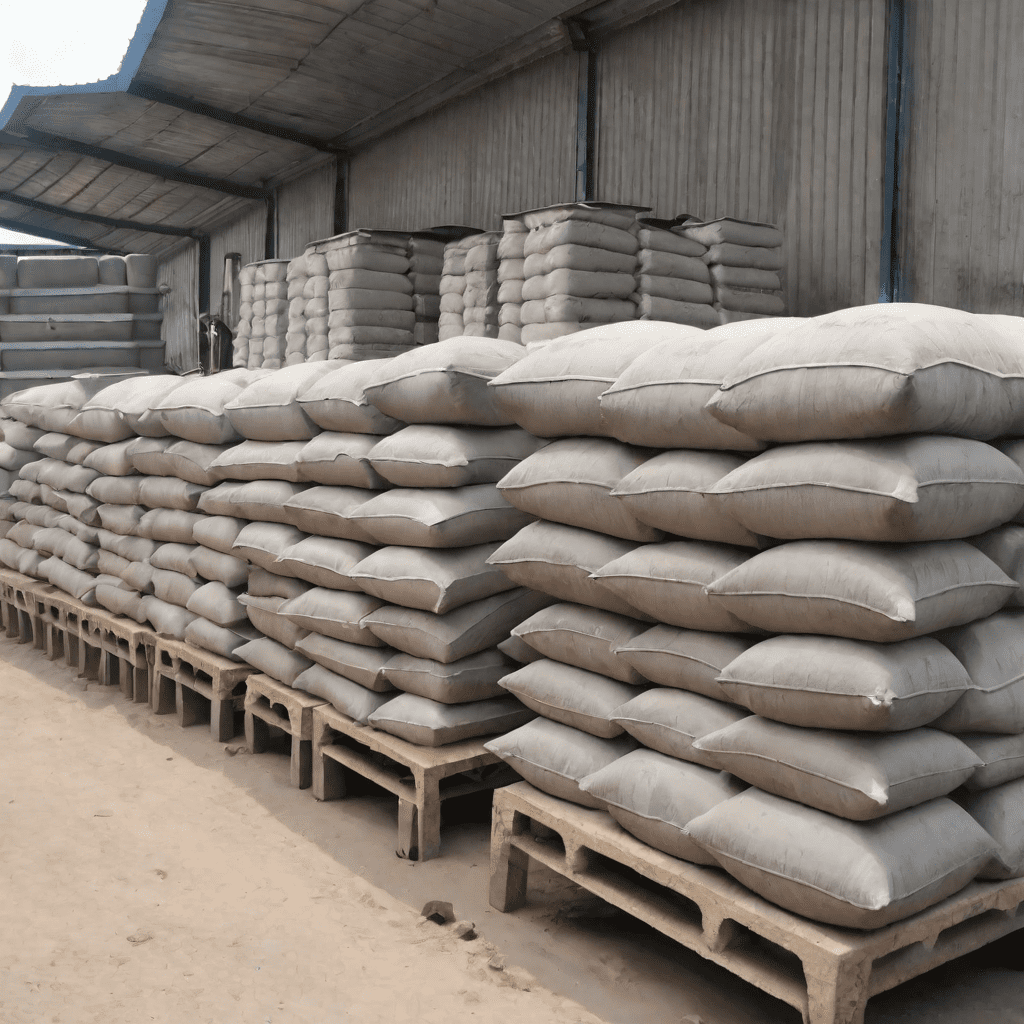
Cement is a critical construction material required for building Nigeria’s rapidly growing infrastructure. As Africa’s largest economy, Nigeria has major needs for housing, roads, commercial buildings and other structures that drive cement demand. However, the price of cement in Nigeria has seen significant volatility over the past decade, making it difficult for builders and consumers to plan their budgets.
Key takeaways:
Cement prices in Nigeria have been highly volatile over the past decade, fluctuating between 2,500 – 4,500 Naira per 50kg bag. This makes budgeting difficult for builders.
- Several factors impact pricing like production costs, distribution challenges, exports, government policies and construction demand vs supply. Understanding these drivers provides insight into price changes.
- Historical data shows cyclical swings in prices linked to shifts in demand-supply dynamics, with recent years seeing sharp increases. Current prices range from 6,000 – 8,500 Naira across major brands.
- Expert forecasts indicate either stable growth around 3,500 – 4,000 Naira or a high price scenario up to 4,500 – 5,000 Naira per bag in 2024 depending on key indicators.
- Players can manage cement price uncertainty through strategies like scheduling construction in off-peak periods, bulk buying at lower prices, using alternate suppliers and passing on price risks in contracts.
Looking forward to 2024, analyzing the key factors influencing cement prices can provide an indication of the potential trajectory. This article will examine the historical price trends and supply-demand dynamics shaping Nigeria’s cement market. Using this data, we will forecast the most likely scenario for cement prices in Nigeria in 2024.
Current Cement Prices by Major Brands
The major cement brands in Nigeria and their current approximate retail prices per 50kg bag are:
- Cement prices in Nigeria can vary significantly between brands, regions, and time periods. Below are the current approximate retail price ranges per 50kg bag for the major cement producers in Nigeria as of early 2023:
- Dangote Cement: Nigeria’s largest cement producer with roughly 60% market share. Its flagship brand sells for between ₦6,500 – ₦8,800 per bag across different regions.
- Ashaka Cement: A subsidiary of Lafarge, its prices typically range from ₦6,100 – ₦8,300 per 50kg bag. Ashaka has major operations in the northern and southwest regions.
- Eagle Cement: A relatively new but rapidly growing cement company based in the south-south. Eagle cement retails for ₦6,200 – ₦8,400 per bag across its markets.
- BUA Cement: Nigeria’s second largest cement maker, BUA sells between ₦6,300 – ₦8,600 per 50kg bag. BUA commissioning new plants aims to grow its market share substantially by 2024.
- Ibeto Cement: The prices for this indigenous cement brand range from ₦6,000 – ₦8,100 per bag in South-East and South-South Nigeria where it’s mainly sold.
- Elephant Cement: Owned by Lafarge WAPCO, Elephant cement is priced between ₦6,150 – ₦8,250 per 50kg bag in its key South-West and North-Central markets.
Other brands

- Sokoto Cement: A regional cement company based in the North-West. Sokoto cement is priced from ₦6,000 – ₦8,000 per 50kg bag in Sokoto, Kebbi, Zamfara and other nearby states.
- UNICEM Cement: A key cement brand in the South-South and South-East regions, owned by United Cement Company Nigeria (UNICEM). UNICEM cement retails for ₦6,500 – ₦8,500 per 50kg bag.
- Crown Cement: Manufactured by Crown Cement Factory Limited, Crown cement is sold primarily in the North-Central zone at ₦6,200 – ₦8,300 per bag.
- Burham Cement: A subsidiary of BUA Cement, Burham cement is available in the South-West region at prices ranging from ₦6,000 – ₦8,100 per 50kg bag.
- Ewekoro Cement: Produced by WAPCO in Ogun state, Ewekoro cement retails for ₦6,300 – ₦8,500 per 50kg bag in South-West Nigeria where it’s primarily sold.
Types of Cement Available in Nigeria
Nigeria produces and utilizes various types of cement to meet diverse construction requirements:
Portland Pozzolana Cement (PPC): Portland Pozzolana Cement, a blend of Portland cement and pozzolanic materials such as fly ash or volcanic ash, emerges as a frontrunner in the evolution of cement formulations. Renowned for its ability to enhance durability, reduce carbon footprint, and improve workability, PPC finds its niche in projects ranging from mass concrete works to marine and hydraulic structures.
Rapid Hardening Cement: In the realm of time-sensitive projects, Rapid Hardening Cement stands as a testament to innovation. Engineered for swift setting and early strength gain, this variant accelerates construction timelines, catering to needs such as road repairs, precast elements, and cold weather concreting.
White Cement: Aesthetic considerations find expression in White Cement, specially formulated to offer a pristine finish. Widely employed in architectural designs, decorative elements, and artistic applications, White Cement elevates the visual appeal of structures, lending a touch of sophistication to the built environment.
Low Heat Cement: For projects grappling with thermal differentials, Low Heat Cement emerges as a stalwart solution. Engineered to minimize heat generation during hydration, this variant ensures the long-term structural integrity of massive concrete structures, crucial for high-rise buildings and dams.
Sulphate Resistant Cement (SRC): The challenges posed by sulphate-rich environments find a fitting response in Sulphate Resistant Cement. With its ability to withstand sulphate attacks from soils or water, SRC safeguards concrete from deterioration, ensuring the longevity of structures in coastal areas or industrial zones.
Masonry Cement: The backbone of masonry constructions, Masonry Cement offers superior workability, adhesion, and water retention properties. Tailored for mortar applications in brickwork, block laying, and plastering, this variant enhances the quality and durability of housing projects, underpinning community development.
Oil-well Cement: Critical to the success and safety of petroleum exploration and production activities, Oil-well Cement plays a pivotal role in cementing oil wells. Engineered to withstand the rigors of high temperatures and pressures encountered in drilling operations, this variant ensures zonal isolation and well integrity.
Coloured Cement: Infused with pigments to provide a spectrum of colors, Coloured Cement unlocks a realm of design possibilities. From pavements to pathways and landscape features, this variant enhances urban aesthetics, fostering cultural expression through built environments.
Understanding Cement Price Drivers in Nigeria
In the past 10 years, the price of a 50kg bag of cement has fluctuated between 2,500 Naira to 4,500 Naira, a difference of over 75%. Several interlinked factors have caused these major price swings in both directions:
- Production Costs: The cost of raw materials, fuel, electricity and other input costs play a major role in the retail price of cement.
- Export Demand: When neighboring countries need urgent cement supply, local Nigerian prices rise due to diversion of cement for export.
- Distribution Challenges: Inadequate transportation infrastructure drives up internal supply chain costs.
- Competition: Collusive pricing by major producers during high demand periods has spiked prices.
- Government Policy: Import bans, tax changes, and forex rate swings have impacted cement prices.
- Overall Demand: When construction activity rises substantially, demand outpaces supply leading to higher prices.
Historical Cement Pricing in Nigeria
Analyzing pricing over the past decade provides insights into the cyclical cement price swings linked to shifting demand-supply dynamics:
- 2011 – 2013: Prices rose from 2,000 to over 3,500 Naira during extensive infrastructure building.
- 2014 – 2015: Prices exceeded 4,000 Naira as gas shortages drove production costs up despite strong construction demand.
- 2016 – 2018: Prices dropped to 2,500 – 3,000 Naira range as gas supply improved, competition grew, and demand slowed.
- 2019 – 2020: Prices stabilized around 3,000 – 3,500 Naira during steady construction activity.
- 2021 – 2022: Prices crossed 4,000 Naira again due to higher input costs, supply chain issues, and demand growth.
- 2023: Current prices by major brands are ranging from ₦6,000 – ₦8,500 per 50kg bag, indicating continued cost pressures.
- 2024: Expert projections indicate pricing could follow either a stable growth or high price scenario discussed in detail in the forecast section.
Cement Price Forecast for 2024
Based on the combination of current trends in production costs, construction activity and historical pricing cycles, the following cement price scenarios emerge for 2024:
Stable Growth Scenario
If infrastructure development proceeds at a steady pace, input costs remain stable, manufacturers avoid supply shortages, and competition keeps pricing fair, cement prices are forecast to remain around 3,500 – 4,000 Naira through 2024. This relatively stable price outlook will enable a sustained high level of construction.
High Price Scenario
However, if demand surges beyond current capacity, gas supply tightens, distribution challenges multiply and high inflation continues, prices could spike up to 4,500 – 5,000 Naira per bag during periods of peak demand in 2024. This would temporarily dampen some construction activity.
Regional Price Differences
Across Nigeria’s regions, cement prices in 2024 are likely to remain highest in the northern areas further away from the major coastal manufacturing hubs. Prices in regions like South-West and South-East should be 200 – 300 Naira per bag lower than the North-Central and North-West zones.
Strategies for Cement Buyers
Major construction firms and individual home builders can take several steps to manage within the volatile Nigerian cement market:
- Plan construction schedules for off-peak seasons when prices ease
- Place bulk advance orders during lower price periods
- Source from alternate suppliers beyond the major brands
- Pass on price increase risks to property buyers through contracts
- Consider using blended cement which incorporates other materials
The growth of Africa’s largest economy depends on keeping cement sufficiently affordable to support Nigeria’s massive housing and infrastructure needs. While prices are likely to remain unstable, through careful planning, companies can contain input costs while government policies can encourage new investments to expand local cement production capacity.
